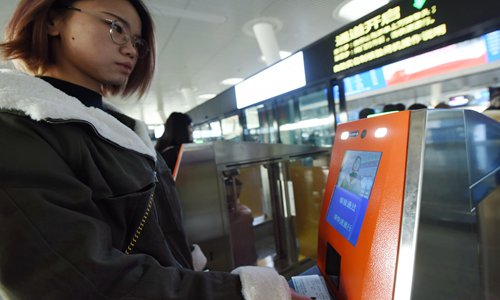HOME >> BUSINESS
Beijing public transport plans to implement facial recognition tech
Source:Global Times Published: 2019/11/3 14:23:39

Travelers wait to enter a railway station in Hangzhou, East China's Zhejiang Province, using an electronic facial recognition system on Thursday. The railway station recently adopted the real name check-in system with facial recognition technology, which can help travelers save time. Other cities applying such technology include Beijing, Shanghai, Zhengzhou, Central China's Henan Province, Wuhan, Central China's Hubei Province and Guangzhou, South China's Guangdong Province, according to media reports. Photo: VCG
Beijing Public Transport plans to implement facial recognition technology to analyze passengers' travel demands, a media report said.
This year is the start of a commercial era of 5G technologies, in which the Beijing public transport system will strive to develop a real-time, accurate and efficient management and control system of intelligent transportation, domestic news site bjnews.com.cn reported on Sunday, citing Zhu Kai, manager of Beijing Public Transport.
Also, it is expected that the app of Beijing's bus system will launch a function to help solve the crowding issues of buses within the year. In addition to providing travel references for passengers, the crowding issue will also be used as a data basis for public transport departments to increase temporary buses, the report said.
The crowding inquiry function will cover 90 percent of all bus routes in Beijing, and related data will be collected through bus card readers. There will be three levels of crowd levels on buses on the app, which are shown in colors—green, yellow and red. Green represents spacious with seats available, yellow means relatively crowded and red is very crowded, according to the report.
Beijing Subway also plans to set up a fast security channel system through facial recognition technology and to classify passengers for different levels of security checks, in order to speed up security checks and improve the overall security performance of public transportation.
New technologies will be developed and applied in areas of new energy, unmanned driving, intelligent scheduling, customized transportation and other aspects to build up an intelligent bus system, Zhu noted.
Posted in: COMPANIES